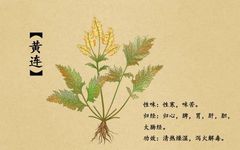Huang
Lian
Ranunculaceae
Scientific Name:Coptis chinensis Franch.
Common Names:Alias:Wang Lian, Zai Lian, Wei Lian, Chuan Lian, Ji Zhua Lian
Morphological Characteristics:Perennial herb, height 15–25 cm. Rhizome yellow, often branched, densely covered with fibrous roots. Leaves basal, petiole 6–16 cm long, hairless; leaf blade slightly leathery, ovate-triangular, up to 10 cm wide, 3-lobed; central lobe somewhat rhombic, with a slender petiole extending 1–1.8 cm downward, lobes further deeply dissected, nearly oblong, apex acute, margin with needle-like serrations; lateral lobes obliquely ovate, shorter than the central lobe, often 2-deeply lobed or rarely 2-whole lobed, lobes often further deeply dissected; upper surface along veins covered with short soft hairs, lower surface hairless. Flower stalks 1–2, equal to or longer than leaves; dichotomous or multi-branched umbel, with 3–8 flowers; bracts lanceolate, 3–5 deeply lobed; sepals 5, yellow-green, elongated ovate to lanceolate; petals linear or linear-lanceolate, numerous stamens, outer whorl of stamens slightly shorter or nearly equal in length to petals, anthers broadly ovate, yellow; carpels 8–12. Capsules 6–12, with stalks, 6–7 mm long. Seeds elongated ovate, brown. Flowering period: February to April. Fruiting period: March to June.
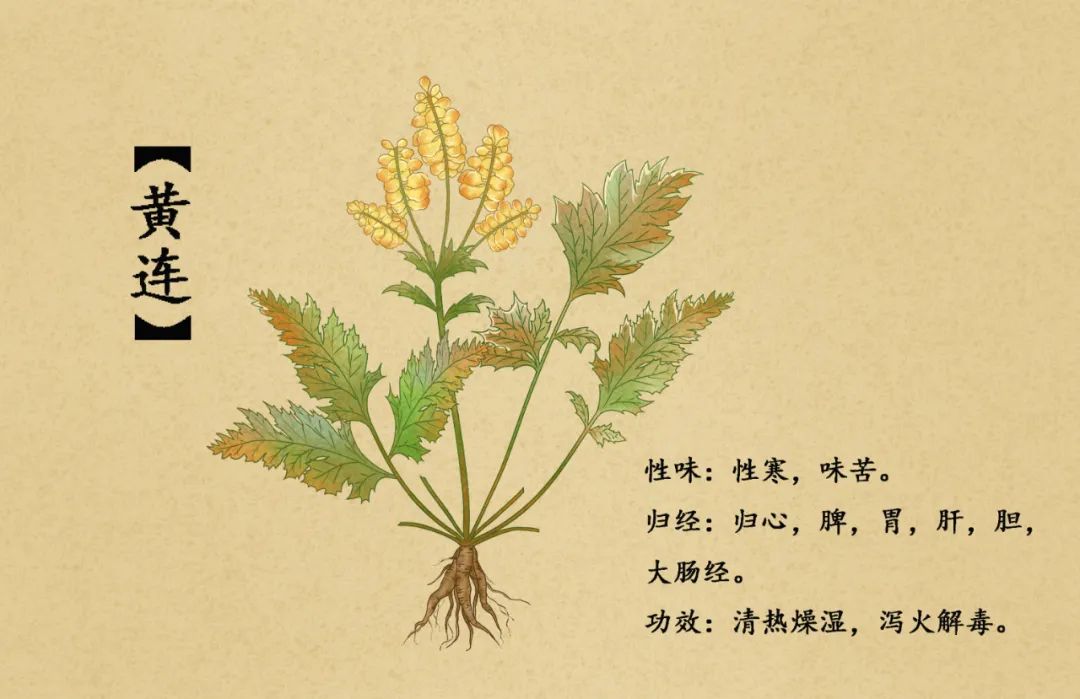
Habitat Distribution:Wild or cultivated. Distributed in Sichuan, Guizhou, Hubei, Shaanxi, and other regions.
Chemical Composition::Huang Lian contains berberine 7–9%, coptisine, methylcoptisine, palmatine, and other alkaloids, as well as berberine ketone and berberine lactone.
Properties and Channels::Bitter, cold. Enters the Heart, Liver, Stomach, and Large Intestine meridians.
Functions and Indications::Clears heat, dries dampness, detoxifies, and kills parasites. Used for epidemic heat toxins, febrile diseases, heat excess causing irritability, fullness and nausea, bacterial dysentery, heat diarrhea with abdominal pain, lung abscess, vomiting, nosebleeds, hematochezia, diabetes, malnutrition, ascariasis, whooping cough, sore throat, fiery eyes, oral ulcers, carbuncles and skin toxins, eczema, and burns. Caution: Use with care in cases of Yin deficiency with heat, stomach deficiency with nausea, and spleen deficiency with diarrhea, especially in cases of early morning diarrhea.
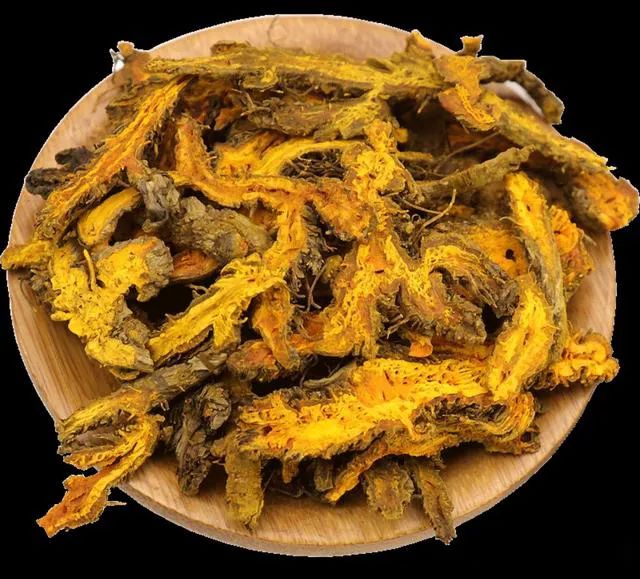

The Story of Huang Lian
It is said that long ago, in the Huangshui Dam of Shizhu, there lived a doctor named Tao, who relied on his daughter for companionship. Doctor Tao hired a male assistant named Huang Lian to help him plant flowers and herbs. That year, many people near Huangshui fell ill with a strange disease, but Doctor Tao’s daughter was lucky enough not to catch it. One day, while out for a walk, she discovered a beautiful wild herb on the hillside and brought it home to plant in the garden. Huang Lian, who had a crush on her, took care of the flowers and herbs, not forgetting to water the wild herb as well. Over time, the wild herb grew lush and green. The following summer, Doctor Tao went out to treat patients and was away for more than ten days. During this time, his daughter fell ill and grew thinner by the day, until she was just skin and bones. Several friends tried every means to cure her illness but to no avail. Huang Lian thought, why not try the wild herb from the garden? He pulled it up by the roots, washed it clean, and boiled it all together. When he lifted the lid, the wild herb and the soup had turned yellow. Huang Lian wanted to serve it to Doctor Tao’s daughter but hesitated, fearing it might be toxic. He decided to taste the soup first and found it very bitter.
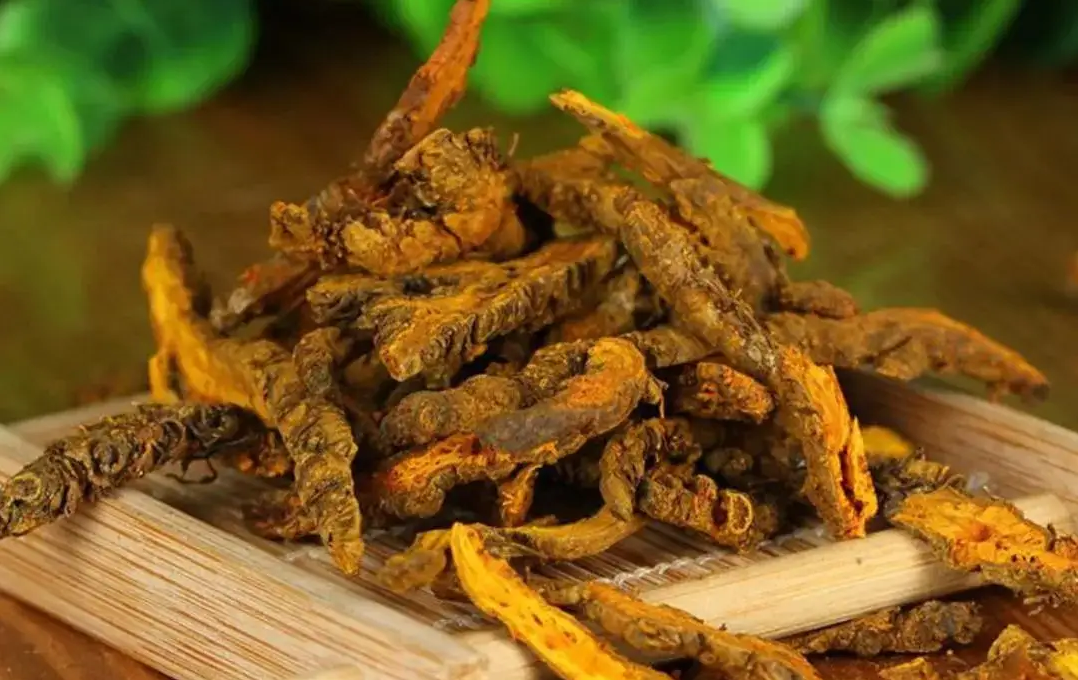
After two hours, seeing that he was still alive, Huang Lian knew the wild herb was not toxic and finally served a bowl to Doctor Tao’s daughter. Strangely enough, after drinking the wild herb soup, she recovered. She told Huang Lian, “This is a good medicine, but it is too bitter.” Huang Lian, who secretly loved her, felt a pang of sadness as she remained unaware of his feelings. When the villagers learned of this news, they all went to dig up the wild herb to make soup, and everyone recovered. Soon after, Huang Lian died in Doctor Tao’s house from his unrequited love. Before he died, Doctor Tao’s daughter finally realized his feelings. To commemorate him, people named this bitter herb that clears heat and detoxifies “Huang Lian.”
【Disclaimer: We respect originality, and our main purpose is to share information. Copyright belongs to the original author. If your rights are infringed, please inform us promptly, and we will delete it within 24 hours.】
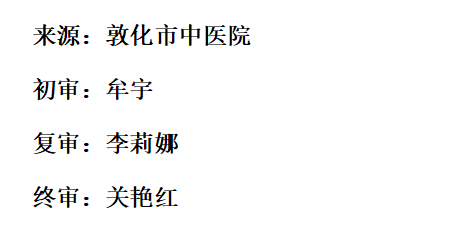

Scan to Follow Us

Great Medicine, Great Integrity Great Virtue, Great Capacity

